|
November 12, 2021 - No. 106
Nunavut
Workers Fight for Respect and
Improved Living Standards Under
the Most Difficult Conditions  
Manitoba
• University of Manitoba Faculty Strike to Defend Their Rights and Public Education
Nunavut
 Four
thousand public sector workers employed by the Government of Nunavut
(GN), whose collective agreement expired at the end of September
2018, are
fighting for their rights and dignity and for improved living standards
for all, under the most difficult conditions. These workers are members
of the close to 5,000-strong Nunavut Employees Union (NEU). Members
include custodians, social workers, payroll officers
and nurses. Four
thousand public sector workers employed by the Government of Nunavut
(GN), whose collective agreement expired at the end of September
2018, are
fighting for their rights and dignity and for improved living standards
for all, under the most difficult conditions. These workers are members
of the close to 5,000-strong Nunavut Employees Union (NEU). Members
include custodians, social workers, payroll officers
and nurses.
The NEU is a component of the Public Service Alliance
of Canada (PSAC), the largest union of federal employees. Some of these
workers' main demands are significant wage increases, improved
benefits, an increase in the Nunavut Northern Allowance (NNA), support
for mental health and paid leave for victims of domestic violence. The NNA is a benefit paid to government employees
designed to make up for the difference in the cost of living between
Nunavut and designated southern centres and to equalize the
compensation of employees across Nunavut who face different economic
conditions. There has been no increase in the NNA for 12 years, the
union notes.
Nunavut public sector workers have been on the front lines of the
fight against the pandemic. They have worked throughout COVID-19
outbreaks without a raise during that time.
"It's causing a lot of mental health issues, and stress and anxiety
on families and people who are working really hard and making hard
decisions like whether they'll pay the bills or put food on the table,"
NEU President Jason Rochon told the press.
One of the main problems facing the Nunavut workers is that close to
90 per cent of the territorial government's budget comes from federal
transfers, with the remainder coming from individual and corporate
taxation. Nunavut has a population of around 35,000 people,
approximately 85 per cent of whom are Inuit, and the revenues from
taxation are very limited. This plus the federal transfers are inadequate to meet
the needs of the people. The cost of living in Nunavut is one of the
highest in the country. Nunavut is the largest and northernmost
territory of Canada and the fifth largest administrative division in
the world. The people of Nunavut live in 25 communities spread
across this vast territory, with the largest number, close to 8,000,
residing in the capital Iqaluit. Traveling from one community to
another is mainly by air, and most food and other supplies arrive by
plane or by boat during the summer.
The housing crisis in Nunavut is acute. Residents pay
the highest rents in the country. According to a report published by
PSAC North in 2017, close to 50 per cent of the population live in
inadequate housing, and 57 per cent live in public housing, compared to
six per cent in the rest of Canada. PSAC identifies the housing crisis
as
a major contributing factor to high rates of poverty, food insecurity
and suicide.
Difficult Negotiation
The GN workers are demanding that the territorial government stand
with them in improving their living standards. So far, their demand has
not been met with success. There are no negotiations at present.
In
November 2019, the GN reduced its offer on the NNA by half, while sticking to a wage offer well below inflation.
The negotiation committee felt it had no choice but to file a statement
of claim with the Nunavut Court of Justice alleging bad faith
bargaining, a violation of the Public Service Act.
The statement of claim was filed in November 2019 and has not yet been
heard, which interrupted negotiations. The GN later
said that the reduction of its offer on the NNA was actually a calculation error that would
be remedied under mediation, but negotiations have been on hold ever
since. The union made it clear that it would withdraw its bad faith
bargaining claim if the government came back to the table and presented
an offer acceptable to the workers.
Water Crisis in Iqaluit
A state of emergency was declared in Iqaluit in
the second week of October when a high concentration of fuel was found
contaminating the tank that supplies water to the city. Since then, the
state of emergency has been extended to the end of November. The NEU
represents most City of Iqaluit
employees (their collective agreement is separate from that of the GN
and was recently renewed) who are working tirelessly to resolve the
situation through investigation, testing, repairs, and the distribution
of water.
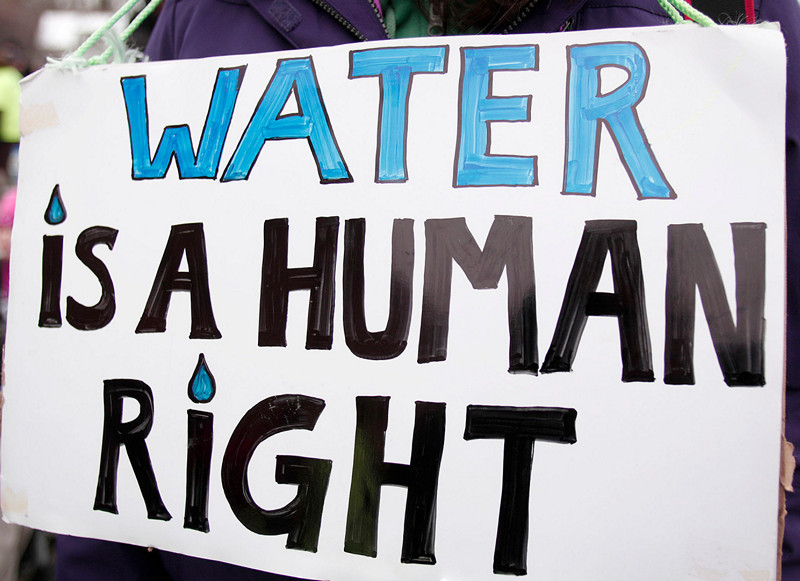 Under
the state of emergency, people are not allowed to drink
tap water or use it for cooking, even if it is boiled; residents have
had to pay exorbitant prices for bottled water. Many patients
had to travel outside the territory for treatment for several weeks
because hospital staff are not able to wash their hands
or sterilize instruments. This situation is taking a
heavy toll on the community's physical and mental health. Under
the state of emergency, people are not allowed to drink
tap water or use it for cooking, even if it is boiled; residents have
had to pay exorbitant prices for bottled water. Many patients
had to travel outside the territory for treatment for several weeks
because hospital staff are not able to wash their hands
or sterilize instruments. This situation is taking a
heavy toll on the community's physical and mental health.
This
is not the first time Iqaluit has had to deal with contaminated water.
This crisis, the people of Nunavut are saying, in addition to three
water crises over the past four years, reveal a chronic problem.
Northern communities are affected by aging and poor infrastructure
causing water emergencies, and they continue to struggle with water
quality and supply issues.
"This crisis is the result of decades of broken promises and ongoing
inequalities that Inuit and Indigenous communities face," said Lorraine
Rousseau, PSAC North Regional Executive Vice-President, in a press
release. "Why haven't governments learned from past mistakes and taken
the necessary steps to protect our water supplies and the safety
of our communities?" she asks.
In a conversation with Workers' Forum, NEU President Jason
Rochon said: "We are trying to get the government back to the table. We
have members who have been without a contract for three years and we
know that the cost of living has gone up so much. This is causing so
much stress, especially with COVID-19. We have people who have to pay
insane amounts for water, which is a basic human right. Workers must be
compensated fairly. They have to be treated with respect. We cannot
accept having children going to school hungry. The food insecurity is
very high here. And there have not been increases in the Nunavut
Northern Allowance for 12 years. Politicians know that and
employers know that. They have to step up to the plate and treat
workers with respect."
He added that workers do not want to go on strike but a strike vote
will be held if there is no progress in getting an offer workers
deem acceptable.

Manitoba
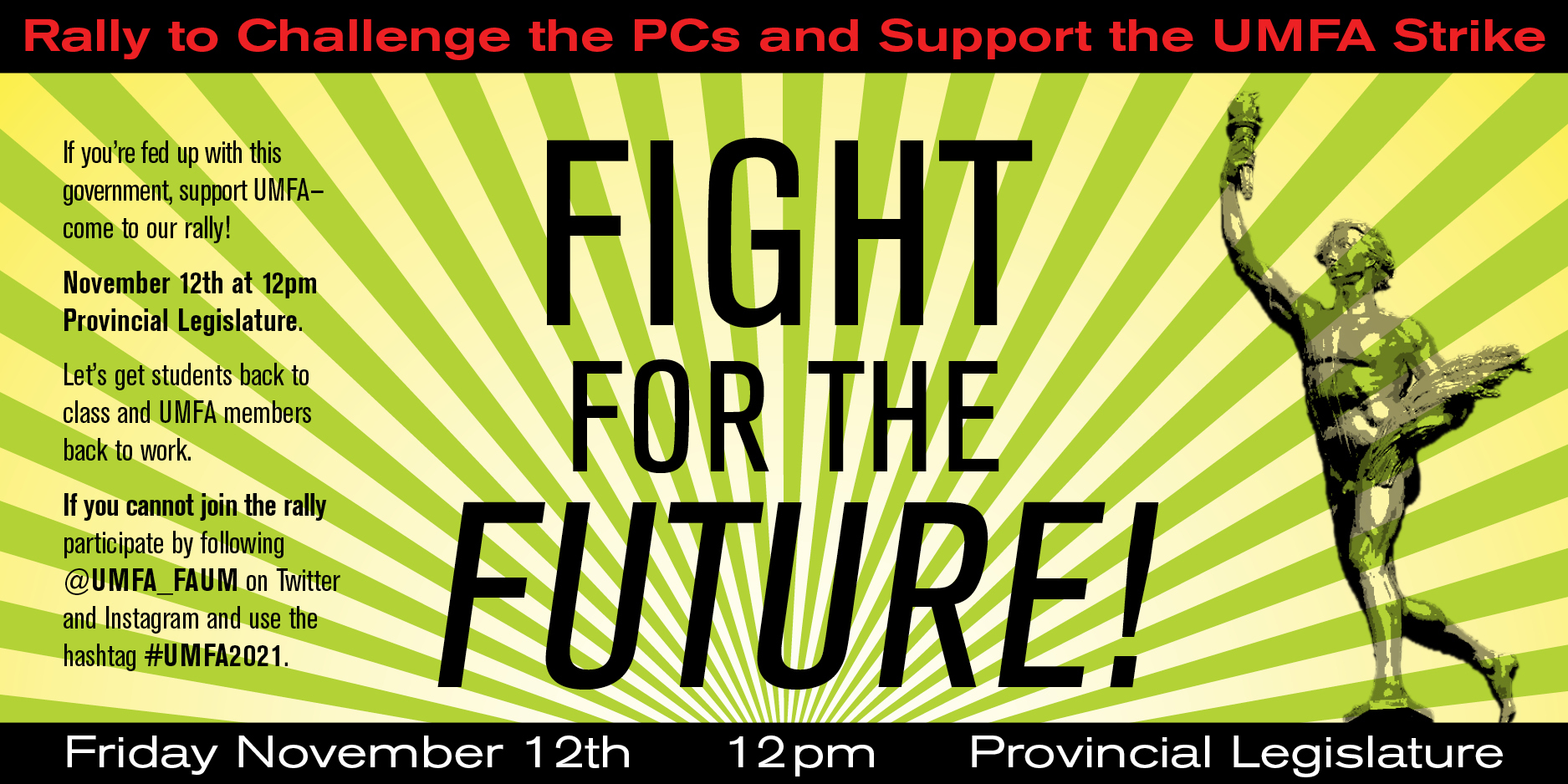
Professors, instructors and librarians, over 1,200 members of the
University of Manitoba Faculty Association (UMFA), have been on strike
since November 2 after negotiations between the association and the
university administration reached an impasse. The main issue in dispute
is increased salaries needed to recruit and retain staff whose
salaries have been frozen since 2016, with the result that, according
to Statistics Canada data, the university has the second-lowest
average salaries for full-time teaching staff out of the 15 largest
research-intensive universities in Canada.
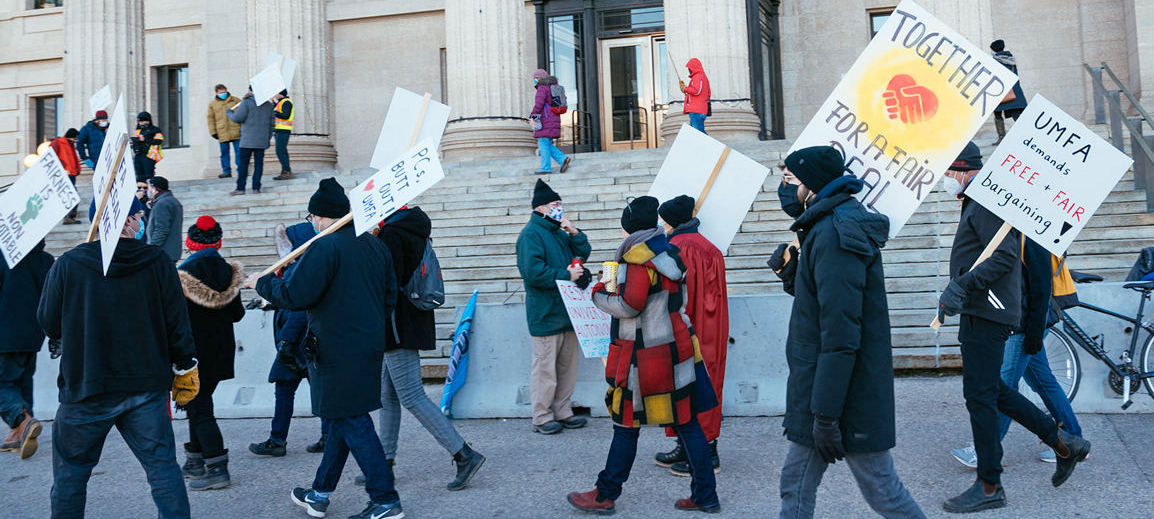
Striking workers picket Manitoba legislature building in Winnipeg, November 9, 2021.
Earlier this year the Manitoba Court of Appeal upheld a lower
court's ruling that the government acted unlawfully in its
interventions in bargaining at the university in 2016. However, the
UMFA reports that the university has yet to compensate UMFA members for
wage increases that were unlawfully removed from the bargaining table.
The UMFA reports that the University of Manitoba President Michael
Benarroch, after confirming that salaries have fallen behind by eight
per cent compared to inflation alone, "admitted that the government has
once again instructed him to offer salary increases that mimic the Public Services Sustainability Act."
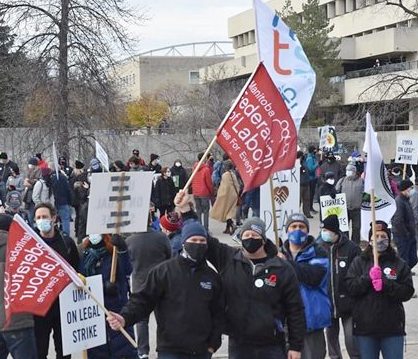 The Manitoba government introduced the Public Services Sustainability
Act in 2017. It was passed by the legislature and, although never
enacted, has been used to claim a "mandate" to impose wage restrictions
on public sector workers. The wage caps are zero per cent in each of
the first two years of a four-year agreement, 0.75 per
cent in the third year and one per cent in the fourth year. In 2020, a
Court of Queen's Bench judge ruled that the act violated the right of
120,000 public sector union members to meaningful collective
bargaining. The government appealed and the Manitoba Court of Appeal
overturned the lower court decision in October. The Partnership to
Defend
Public Services, a group of unions representing over 100,000 Manitoba
workers, will be seeking leave from the Supreme Court of Canada to
appeal. The Manitoba government introduced the Public Services Sustainability
Act in 2017. It was passed by the legislature and, although never
enacted, has been used to claim a "mandate" to impose wage restrictions
on public sector workers. The wage caps are zero per cent in each of
the first two years of a four-year agreement, 0.75 per
cent in the third year and one per cent in the fourth year. In 2020, a
Court of Queen's Bench judge ruled that the act violated the right of
120,000 public sector union members to meaningful collective
bargaining. The government appealed and the Manitoba Court of Appeal
overturned the lower court decision in October. The Partnership to
Defend
Public Services, a group of unions representing over 100,000 Manitoba
workers, will be seeking leave from the Supreme Court of Canada to
appeal.
In an information bulletin prior to the strike the UMFA informed students:
"The current round of bargaining involves many issues including
equity, diversity and inclusion, childcare, intellectual property, and
more. The most important issue is salary. UMFA salaries have been
frozen since 2016, as part of an austerity agenda embodied in the
still-unproclaimed Public Services Sustainability Act
(PSSA), which was
used to freeze salaries in the public sector. While the legislation was
used to justify freezes for UMFA members, other public-sector workers,
like Nurses and Hydro workers, were able to achieve settlements that
were greater than those outlined in the PSSA."
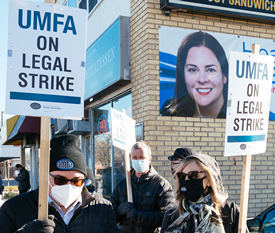 The
strike
has the support of the University of Manitoba Students Union, several
student groups on the campus, the Manitoba Nurses' Union
and other unions and the Manitoba Federation of Labour. The
strike
has the support of the University of Manitoba Students Union, several
student groups on the campus, the Manitoba Nurses' Union
and other unions and the Manitoba Federation of Labour.
Underfunding and low salaries at the university impact not only the
university community but the society as a whole. A health care rally was
organized at the Manitoba Legislature on November 9 by instructors in the
College of Nursing, whose 54 faculty are members of the UMFA. The same
day a letter signed by 40 of the nursing faculty was delivered to Audrey Gordon, Minister of Health and Seniors
Care and Minister of Mental Health, Wellness and Recovery which
outlined the need to create "a salary scale that will attract new
faculty and retain current faculty who can step up to the challenge of
preparing nurses for a health care system in crisis due to the nursing
shortage, a pandemic, and increasing interpersonal violence and moral
distress on the frontline." The letter pointed out that in the past two
years 15 per cent of nursing faculty had retired or left
the college and that nursing instructors and assistant professors earn
salaries that are less than general duty nurses. They drew attention to
the effect of the strike on "all workforce sectors, in particular, the
health care sector" where a prolonged strike "will delay the graduation
of approximately 110 nursing students in Spring 2022, adding more
strain to the severe nursing shortage that exists in Manitoba."
In the health care sector the shortages of trained personnel have
been brought most vividly to public attention over the course of the
pandemic, but it is not just health care that is affected. Government
interference to impose wages that do not even keep up with the cost of
living increase the difficulty of recruitment and retention for public
services, including educators, with far-reaching impact. The demand
of the UMFA for an end to government interference is just and has broad
support.
With their strike the University of Manitoba faculty are defending
their rights and those of their students, pointing out that their
working conditions are students' learning conditions. They are also
standing up and fighting for the public education system upon which the
whole society depends.
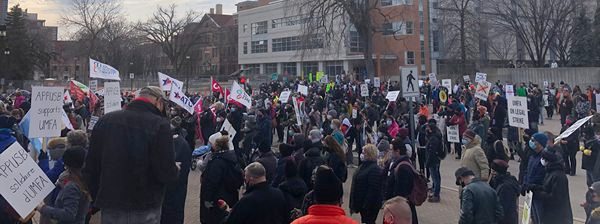

(To access articles individually click on the black headline.)
PDF
PREVIOUS
ISSUES | HOME
Website: www.cpcml.ca
Email: office@cpcml.ca
|

